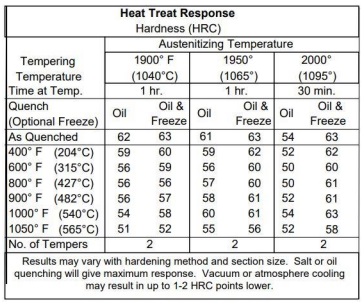Technical Information – FF CPM154 Core
Composition
FF CPM154 Core is a san-mai layered stainless damascus composed of a Crucible CPM-154 core and AEB-L + AISI 304 steel placed on the sides. CPM-154 is a well-proven American-made wear-resistant powder steel for knives. The steel is rich in carbides, Chrome, and Molybdenum and reaches a silver-shiny core. Excels in drawing attention, sharpness, and durability.

Machining conditions
Our products are soft annealed to provide the best possible machining, reaching hardness approx. 280HV. You can use all conventional types of machining. We don’t recommend cutting (format) material on machine shears. We recommend bandsaw cutting, milling, laser, or waterjet cutting. We recommend setting the knife edge’s position outside of damascus flat. The thickness of the core slightly expands from the center to the edges.
- Milling – monolithic carbide mill — Vc50-60 m/min
- For hard-milling (sizing) with monolithic carbide, mill feed up to Vc100 m/min
- Milling with VBD mill — Vc55-80 m/min
- Milling with HSS-Co mill — Vc14-16 m/min
- Drilling – HSS-Co drill — Vc10-12 m/min
- Drilling – PVD coated carbide drill —Vc60-80 m/min.

Grinding
You can grid our steel on all conventional types of grinders. We recommend belt-grinders or Berger grinding machines. For belt grinders, we recommend sanding belts with ceramic grains, like 3M Cubitron II; however, all ranges of conventional abrasives are usable (for example, SAIT, Klingspor, Norton, VSM, etc.). Watch out for not overheating (tempering) the steel by grinding. When it’s heat-treated, it may lose the required properties.
Soft annealing Soft annealing– Heat the material in a furnace to 820 °C / 150°- Heat the material in a f
- Our materials are soft annealed. You have to apply this process only after forging.
- Protect the material before oxidation and heat in a furnace to 900°C / 1652°F
- Hold at the temperature for 2 hours at least
- Slow cooling in a furnace to 704°C / 1300°F (cooling 15°C / 59°F per hour)
- Hold at the temperature for 4 hours
- Remove material from a furnace and keep slow cooling on the air.
Hardening
Hardening is necessary to reach full corrosion resistance and the final hardness of the steel. We recommend hardening the steel by heat treatment professionals using vacuum technology like Bodycote. Recommended hardening process:
- Preheating temperature 760 °C / 1400°F
- Austenitizing temperature 1050-1093 °C / 1922-2000°F.
- Hold at the temperature for 30-60 minutes
- Cooling by oil or nitrogen gas or air up to the temperature lower 50°C / 122°F
- Salt-bath hardening oil is also possible 540°C / 1004°F than air cooling lower 50°C / 122°F
- Immediate deep freeze -150/-196°C / -302/-384°F and hold for 1-3 hours. Hardness will increase by 1-2 HRc).
Tempering
After hardening, it’s necessary to begin the tempering process as soon as possible.
- For knife blades, we recommend a tempering process 2x2h 200°C / 392°F
- To keep blade flexibility, we recommend a minimal tempering temperature 200°C / 392°F
- Tempering over 400°C / 752°F causes lower corrosion resistance.

Etching
To properly contrast the damascus steel layers, it’s necessary to etch the material (blade). You can experiment with various etching techniques depending on your skill; however, following the below-mentioned steps, you’ll get nice results.
- Ensure that the blade’s surface is smooth, clean, and free of scratches (since etching won’t hide them), finished up to 1000+ grit or polished.
- Properly degrease the blade; cleaning it in the soap-water works well.
- Before etching, we recommend testing the solution on a sample piece of heat-treated material.
- You can reuse etching solution several times. Before you get the blade into the solution, check if there’s no dirt on the solution’s surface.
- After etching, you have to neutralize the blade using Na₂CO₃ (Sodium carbonate) or NaHCO₃ (Baking soda). You can also use soap water and properly clean the etching residues from a blade.
- Dry the etched blade. We recommend spraying the blade with WD-40 (or similar) and drying it again to remove any possible residues.
- You can slightly polish the etched blade on a buffing wheel for better contrast. We recommend testing it on a sample piece.

Marking
FF CPM154 Core
@futuronforge #HardCOREfuturon #FFCPM154core
Adresa
Futuron Forge s.r.o.
EU – Czech Republic
Tržiště 372/1
118 00 Praha
IČ: 08244189
DIČ: CZ08244189
Sledujte nás
[instagram-feed]